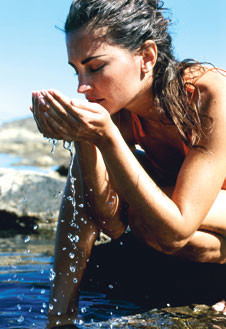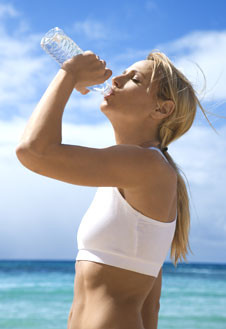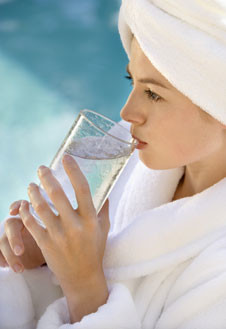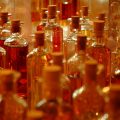 Water is harm and benefit Man needs at least 1.5a liter of water a day is the truth firmly rooted in our heads. Years have passed, a lot of water has passed under the bridge, and here two researchers from the University of Pennsylvania at Philadelphia proved that this golden rule is wrong. No matter how much they studied the scientific publications on this topic, they could not find a single study that could confirm the benefits of drinking a bottle of water a day. So collapsed one of the unshakable postulates. And what about the rest? Our questions are answered by specialists.
Water is harm and benefit Man needs at least 1.5a liter of water a day is the truth firmly rooted in our heads. Years have passed, a lot of water has passed under the bridge, and here two researchers from the University of Pennsylvania at Philadelphia proved that this golden rule is wrong. No matter how much they studied the scientific publications on this topic, they could not find a single study that could confirm the benefits of drinking a bottle of water a day. So collapsed one of the unshakable postulates. And what about the rest? Our questions are answered by specialists.
Drinking plenty of water helps the kidneys work.
Wrong. The kidneys work by themselves and do not need to be cleaned from slags. On the contrary. “Excessive water consumption can be harmful,” says nephrologist Pierre Ronso. To maintain a constant volume of fluid in the body, the kidneys can reabsorb some of the water that has already been filtered. They provide a fine regulation of the volume and concentration of urine. “The more a person drinks, the less the kidneys have to save and, accordingly, reabsorb water,” explains Pierre Ronso. “The tubules that are meant for this are becoming less and less common and are not working.” As a result, with strong heat and great physical exertion, when the body needs to save water, reabsorbing tubules will be worse able to cope with their work.
Drinking plenty of fluids protects against urinary tract infections.
Wrong. If the infection is already there, it is recommended to drink a lot to increase the dilution of urine. This reduces the concentration of pathogens in the bladder and causes him to empty more often. But increased water consumption does not prevent contamination. “In order to avoid infection, one must first of all ensure that intimate hygiene is observed. And women who are prone to frequent urinary tract infections are advised to urinate after intercourse, ”reminds Pierre Ronso.
Water does not contain calories.
 Right.But only if the water is drunk in its pure form, without additives. Some drinks look like water in color, but they are flavored. If you read the label carefully, you may find that some "waters" contain 20 calories per liter. Of course, if you add sugar-containing syrup to the water, then the calorie content will increase.
Right.But only if the water is drunk in its pure form, without additives. Some drinks look like water in color, but they are flavored. If you read the label carefully, you may find that some "waters" contain 20 calories per liter. Of course, if you add sugar-containing syrup to the water, then the calorie content will increase.
Water removes toxins
Wrong. Urine allows you to release the human body from urea, as well as some toxic substances and medicines. But water does not affect the elimination of toxins. Whatever amount of liquid is processed, the kidneys hold up the molecules the body needs, and the rest are passed. Urine will simply have a higher or lower concentration. So if we drink more, then the water circulating in our body will not become cleaner from this.
Drinking plenty helps to lose weight.
Wrong. "Water does not dissolve any fat or sugar and does not cause a loss of fat mass," says nutritionist Arno Badevan. “It's just a cleansing symbol used in marketing.” If nutritionists tell their patients that they do not forget to drink, it is only in order not to reduce the intake of water in the body, reducing calorie intake. “And if someone cannot do without a bottle of water when he is on a diet, then it’s rather because he wants to stifle hunger,” he explains. “It's a kind of ritual.”
In the plane you have to force yourself to drink
Right. As in the overheated room. In the cabin, the air is under pressure, so it is extremely dry. This is one of those situations when the mechanism for regulating the sensation of thirst is disturbed. So it is better to drink, without waiting for thirst.
Water is rich in mineral salts
 Right. The composition of water varies depending on the region and the rocks through which it passes before it enters your glass. Sometimes there is more sodium in water, sometimes magnesium or potassium. In any case, the content of mineral salts should not exceed a certain level. It is better not to abuse water with a high fluoride content: if it is used too often, it increases the risk of developing fluorosis, which contributes to the demineralization of bones.
Right. The composition of water varies depending on the region and the rocks through which it passes before it enters your glass. Sometimes there is more sodium in water, sometimes magnesium or potassium. In any case, the content of mineral salts should not exceed a certain level. It is better not to abuse water with a high fluoride content: if it is used too often, it increases the risk of developing fluorosis, which contributes to the demineralization of bones.
It is better not to drink while eating
Wrong. “For the stomach to work well, it needs moisture,” recalls Christian Bustier. “And mixing food is better if you drink some liquid at lunch.” Drinking while eating helps digestion, especially if the water is rich in bicarbonates. For constipation, doctors recommend a slight increase in water intake.
When a person drinks a lot, it can be a sign of illness.
Right. Progeny is a mental illness in which a patient drinks fluid in liters without thirst. This is similar to bulimia when a patient eats a lot without feeling hungry.
To get the right amount of water, just quench your thirst.
Right. Thirst is a very accurate signal to regulate water balance. She encourages to drink. Then connect the kidneys, sweating system, etc., regulating the water level in the body. If the water is low, the person will sweat a little, and the urine will become very concentrated. If a person consumes a lot of water, then the urine will be more abundant and lighter. Some are naturally water lids, but, as a rule, one cup of liquid in the morning and two glasses at lunch and dinner are enough. Food, especially fruits and vegetables, will finally fill the water shortage. A special situation only with infants and older people, in whom the process of the formation of thirst can be broken.
Bottled water is better than tap water
 Wrong. Any water intended for drinking is monitored several hundred times a day. It should not even be a trace of pathogenic bacteria. The content of iron, pesticides, sulfates is strictly regulated, as is the concentration of mineral salts. If you drink bottled water, try to use it right after it is opened and store in a cool place. Some studies have shown that individual components of polyethylene terephthalate (PET) can flow into water.
Wrong. Any water intended for drinking is monitored several hundred times a day. It should not even be a trace of pathogenic bacteria. The content of iron, pesticides, sulfates is strictly regulated, as is the concentration of mineral salts. If you drink bottled water, try to use it right after it is opened and store in a cool place. Some studies have shown that individual components of polyethylene terephthalate (PET) can flow into water.
Chlorinated tap water
Right. Chlorine allows you to protect the water from pollution during the passage of water pipes. At the outlet of the tap in water contains about 0.1 mg of chlorine per liter. According to WHO standards, there is no risk to health at concentrations up to 5 mg / l. To get rid of the characteristic smell, it is enough to put the vessel with water for several hours in the refrigerator.
Plastic bottles make it more environmentally friendly
Right. The weight of a 1.5-liter bottle decreased from 38.8 g in 1997 to 33.7 g in 2003. But during this time, the consumption of bottled water has increased by about 35%. So, when we drink tap water, we care about the environment. "Bottled water adds about 10 kg of waste per person per year," according to the website of the French Ministry of Ecology. And it costs 100-300 times more expensive.









